Exempt Employee
An exempt employee is an employee who is exempt from the overtime provisions of the Fair Labor Standards Act (FLSA) in the United States. This means that they are not entitled to receive overtime pay when they work more than 40 hours in a workweek.
The determination of whether an employee is exempt or non-exempt depends on several factors, including their salary level, the way they are paid, and the nature of their job duties.
Here are the general criteria an employee must meet to be considered exempt:
- Salary Level Test: The employee must earn a minimum salary level, which is $684 per week (equivalent to $35,568 annually) for a full-year worker. Please note that these numbers may have changed.
- Salary Basis Test: The employee must be paid on a salary basis, meaning they receive a predetermined amount of compensation each pay period, which cannot be reduced because of variations in the quality or quantity of work performed.
- Duties Test: The employee’s job duties must primarily involve executive, administrative, or professional duties as defined by the FLSA. Each of these categories has its own specific criteria.
It’s worth noting that job titles do not determine exempt status. Rather, it’s the actual job tasks and responsibilities, along with the salary and method of payment, that determine whether an employee is considered exempt or non-exempt under the FLSA.
There are also certain professions and industries that have specific exemptions under the FLSA. These may include teachers, academic administrative personnel, outside sales employees, and others.
Employers must be careful to classify employees correctly as exempt or non-exempt. Misclassification can lead to legal issues, including back pay for overtime for misclassified employees. Always consult with a legal or human resources professional if you’re unsure about the correct classification for an employee.
Example of an Exempt Employee
Suppose Jane is a manager at a marketing company. She is paid a fixed salary of $60,000 per year, which equates to more than $1,153 per week, well above the minimum salary level threshold for exempt status as of the last update in 2021.
Her salary is not reduced based on the quantity or quality of her work. She is paid the same amount regardless of how many hours she works in a week.
In terms of her job duties, Jane’s primary responsibilities include supervising two teams of marketing professionals, overseeing the development and execution of marketing campaigns, and participating in high-level strategy meetings. Her role involves the use of discretion and independent judgment on significant matters.
Based on these conditions, Jane would likely be classified as an exempt employee under the Fair Labor Standards Act (FLSA). This means she is not entitled to overtime pay, regardless of how many hours she works per week.
However, it’s worth mentioning that labor laws can vary by state, and some states may have stricter regulations about who qualifies as an exempt employee. Therefore, employers should ensure that they are complying with both federal and state labor laws. If there’s uncertainty, it’s best to consult with a legal or human resources professional.













